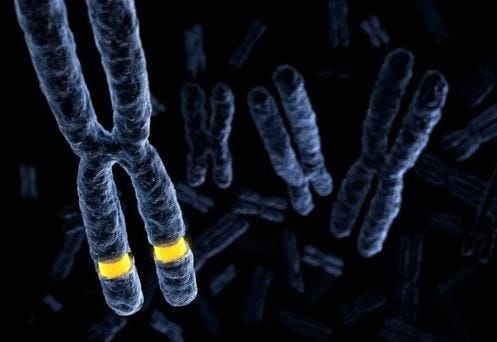Fragile X Treatment Nears Phase 2 Trials
 The highlighted portion shows the mutated X chromosome
The highlighted portion shows the mutated X chromosome
Subscriber Benefit
As a subscriber you can listen to articles at work, in the car, or while you work out. Subscribe NowLiving with Fragile X Syndrome (FXS) can be crippling for a family emotionally, financially and physically; the rare disorder disrupts the skills needed for everyday life, such as thinking, talking and self-care. Boosted by a recent dose of funding, Carmel-based Confluence Pharmaceuticals is taking aim at Phase 2 clinical trials for its drug, which company leaders believe will restore hope and unlock potential for FXS patients. It could mark a major turning point for FXS families, who currently have no treatment options that address the disability’s core impairments.
While FXS is considered a rare genetic disorder, affecting about 180,000 people in the U.S., it’s the leading known cause of Autism Spectrum Disorder (ASD), and about half of FXS patients have autism. In other words, ASD and FXS frequently occur together. Patients with FXS are considered intellectually disabled, and its characteristics include language, social and learning impairments. Patients often struggle with social behavior, inattention, hyperactivity, mood disorders, anxiety and aggression.
“Currently, there are no approved drugs, with the exception of irritability in FXS,” says Confluence President Steve Johns. “So there are no treatments today for the core symptoms of language, repetitive behavior, social behaviors and communications. We’re trying to find a way to treat Fragile X core symptoms.”
Acamprosate is the active ingredient in the startup’s drug, which will focus on pediatric patients and likely begin Phase 2 clinical trials next year. Johns says the drug is unique, because it targets two receptor systems, “which the science has shown to be impaired.” The science involves glutamate, a chemical messenger in the brain that he likens to the gas pedal in a car.
“[In people with FXS], the gas pedal is completely down all the way to the floor all the time. There’s nothing touching the brake, which is the GABA (gamma aminobutyric acid) side of the brain, so these people are living in a constant state of excitability or chaos,” says Johns. “Our drug’s purpose is to lift the foot off the gas pedal, and at the same time, press down on the brake; that rebalancing allows them to gain appropriate levels of focus and social behavior, resulting in improvements in communications as well.”
Confluence has been working on acamprosate for about a decade; Dr. Craig Erickson discovered the drug in 2009 during his time at the Indiana University School of Medicine. Erickson is now the director of the Fragile X Syndrome Research and Treatment Center at Cincinnati Children’s Hospital Medical Center. Johns says Erickson still works closely with the Confluence team and “has become one of the go-to people in the U.S. in terms of FXS and has gained quite a bit of national prominence.”
Erickson has also conducted research in ASD, as that patient population overlaps significantly with FXS. Most recently, the the IU Philanthropic Venture Fund made a $100,000 bridge investment, adding to its original $200,000 investment; the increase will help the startup power through the slowdown caused by COVID-19. Johns says Confluence will likely begin Phase 2 clinical trials in 2022, which could also open the door to patients with ASD.
“[Phase 2 clinical trials] is a major step for us,” says Johns. “Fragile X is a foundational play to the larger ASD. We’ll continue to build our case with FXS, but that will then pull along our work that we want to do in autism as well, since there are significant similarities in terms of the mechanism of action, not only in the compound, but what we’re seeing in terms of the disorders. Once we see success in FXS, we’ll expand directly into autism.”
Because FXS patients often have sensory and mechanical issues that cause eating and swallowing problems, Confluence designed the drug in a “sprinkle” formulation that could be integrated with a child’s favorite foods. The unique feature has opened the door to expanding the startup’s portfolio; another company has already approached Confluence about using its sprinkle formulation for another compound.
However, noting that “the parents are desperate for some sort of help,” acamprosate remains the heart of the startup’s mission.
“We’ve had some remarkable anecdotal stories come from the field—children who were nonverbal who became verbal and started talking,” says Johns. “It’s hard not to be excited about helping people who desperately need help; that’s what motivates our team every day. As we see new efficacy signals coming out of pilot studies, that’s exciting to us and shows the compound is working. We just need to move faster and faster to get it to approval; that’s our major motivation.”
Johns says the recent additional funding has helped the startup overcome some of the challenges caused by the pandemic.
Johns says Confluence has licensed additional intellectual property from Dr. Erickson’s latest discovery.
